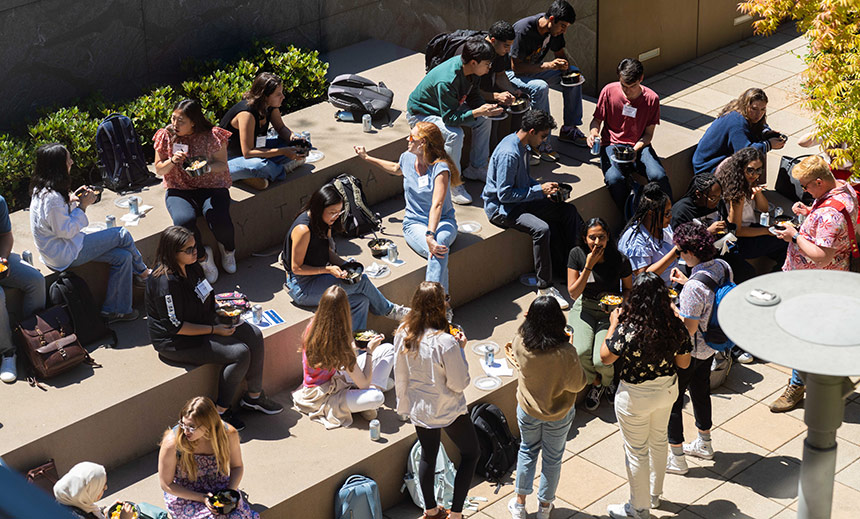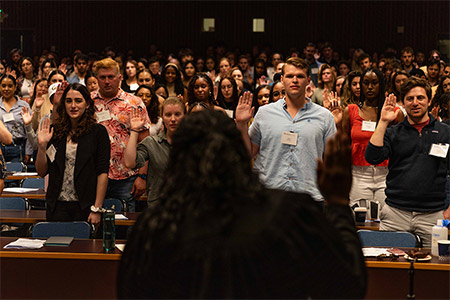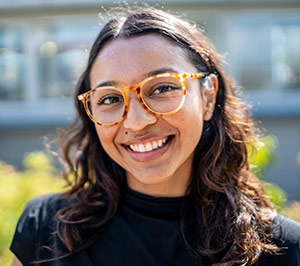
By Gwyneth K. Shaw
Berkeley Law’s Class of 2026 recently arrived on campus with some impressive metrics: A 170 median LSAT score, the highest in the school’s history since it began keeping such records, and a 3.87 median GPA.
Other numbers fill out a richer story about the 340 new 1Ls — and track the arc of a history of admitting and educating students whose backgrounds and experiences help shape not just their own careers in the law, but those of their classmates.

Fourteen percent are the first in their family to get a college degree, 62% are women, and 57% are students of color. A quarter identify as LGBTQIA+. The class comes from 42 states, eight countries, and 129 different undergraduate schools, including 81 who earned an undergraduate degree at a University of California school. Six are members of federally recognized Native American, American Indian, and Alaska Native tribal nations.
“Every year we hope to attract and enroll as strong, dynamic, diverse, and down-to-earth a class as possible,” Dean of Admissions and Financial Aid Kristin Theis-Alvarez says. “You can’t compare classes, but yes, we are very excited about this one.”
Given their diversity, what do members of the Class of 2026 have in common?
“Many of our new 1Ls came to Berkeley Law because of the school’s commitment to public service, but they also have novel ideas about how to accomplish their goals and objectives,” Theis-Alvarez says. “Who we are continues to resonate with future lawyers, and more and more students are thinking about how their work will contribute to building a more just future.”
Building community
Rosie Rios ’26 felt the connection when she visited last spring for admitted students events and heard Dean Erwin Chemerinsky talk about the importance of serving the community. She also learned about the wide range of opportunities to get involved while studying, from the school’s many Student-Initiated Legal Services Projects to its affinity groups.
“From that moment, I felt a strong sense of belonging and knew that I was exactly where I was supposed to be,” she says.
That’s no accident, Theis-Alvarez says.
“Our faculty policy governing admissions is quite clear: ‘As a public institution, Berkeley Law has a responsibility to educate lawyers who will serve the legal needs of all members of society,’” she says. “We take that as a directive, not hyperbole.”

Rios, who has a three-year scholarship through the Public Interest Scholars Program, went to UCLA for her undergraduate degree and earned a master’s in social work from Columbia. As an organizer and a social worker, she has deep experience supporting people impacted by the intersection of the criminal legal and immigration systems — known as “crimmigration.” The daughter of Mexican and Salvadoran immigrants, she was most recently the managing director of the UCLA Prison Education Program.
She attended Berkeley Law’s Pre-Orientation Program, a kind of boot camp for law school, and also enjoyed early connections with her fellow public interest scholars and the La Alianza Law Students Association. That helped her build a community for herself right away, she says.
“Being at Berkeley Law has been an incredible experience. I have the opportunity to learn from professors who are not only knowledgeable, but passionate about what they teach,” Rios says.
The class is stocked with students who worked in a broad array of fields before deciding to go to law school. One was a software engineer for the NBA, another a professional carillonist. Some come from government and politics, others from scientific labs and tech companies: 15 percent of the class have a degree in a STEM field.
Military veterans — including graduates of all five U.S. military academies — are in the class, as are others who did stints in the Peace Corps and Teach for America programs. There’s even a former board game designer, an aerial rope and flying trapeze acrobat, and a jazz saxophonist.
Caleb Charles ’25, co-president of the Student Association at Berkeley Law, has had some time to converse with many new students, including Rios, who was elected with classmate Stephanie Alvarez to the 1L representative positions. He came away thrilled by their “remarkable intelligence and compassion.”
“My interactions with these outstanding individuals have shown me that they each possess exceptional critical thinking skills and a visionary mindset,” he adds. “With guidance and support from our fellow students, world-class faculty, and devoted administration, I have complete confidence in their ability to thrive as Berkeley Law students and beyond.”
Setting the standard
In the wake of the U.S. Supreme Court’s June decision to strike down the use of affirmative action policies in academic admissions, many law schools are wondering what the future holds.
“Understandably, there is a great deal of uncertainty, but we have been admitting students without the use of affirmative action since 1997,” Theis-Alvarez says. “The newest Berkeley Law class clearly demonstrates that there is no ‘trade-off’ between excellence and diversity. And constructing the question in that way is simply wrong.”
She points to the new J.D. class as clear evidence: For the second year in a row, Berkeley Law enrolled a class with the highest LSAT in the school’s history. The students’ median undergraduate GPA jumped from last year’s 3.83 to a record 3.87 for fall 2023. Meanwhile, 18% of the class reported being eligible for Pell Grants, and 29% are first-generation professional school students. Four of the top 10 feeder schools for this class are public schools.
“It’s important to remember that this class is not a collection of statistics, albeit impressive ones. They are real people, deeply deserving and eminently qualified, who poured their hard work and hope into an application for admission to Berkeley Law,” Theis-Alvarez says. “In three short years they are going to enter a profession that will give them access to power and put them in positions that change lives and shape our future.
“That’s part of what I’m considering when reading applications, and what makes Berkeley Law special.”
Just a few weeks into the academic year, Rios agrees.
“My classmates are all incredibly talented, generous, and already fierce advocates,” she says.
“I am so excited to continue to build with them as we become the next generation of legal professionals.”